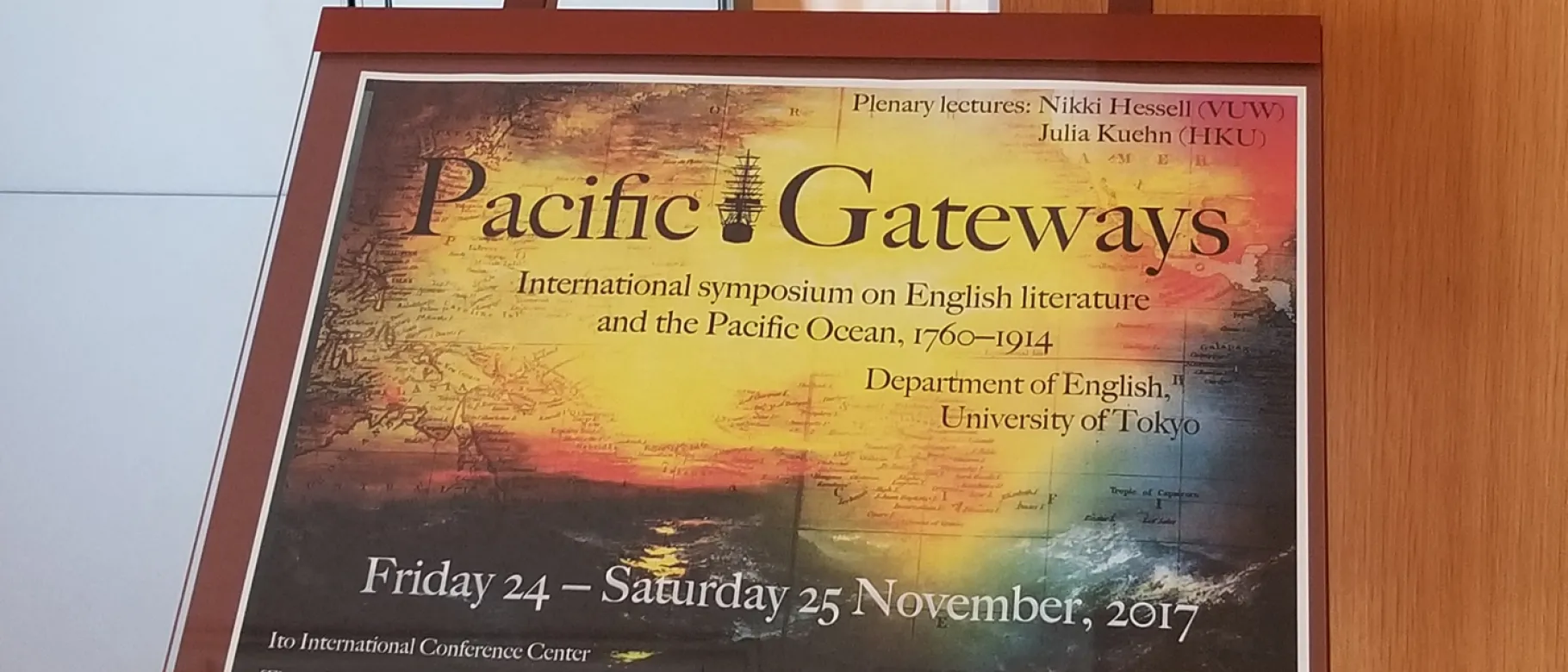English professor Jennifer Tuttle presents material from book-in-progress at international travel writing symposium in Tokyo

Jennifer Tuttle, Ph.D., Dorothy M. Healy Professor of Literature and Health and professor of English, recently presented material from her book-in-process at a symposium in Tokyo, Japan, which was held November 24-25. The event, called "Pacific Gateways," was an international travel writing symposium on English literature and the Pacific Ocean, 1760-1915, hosted by the English Department at the University of Tokyo and convened at the Ito International Conference Center. The program of this highly selective symposium featured scholars from around the world; event participants hailed from such diverse locales as Australia, Bali, China, Hong Kong, Italy, Japan, New Zealand, Singapore and Taiwan; Tuttle was the sole U.S. presenter.
Tuttle's presentation, on Anglo-Chinese writer Edith Eaton, is based on her book project with the working title “Unsettling the US Imperial Pacific: American Nervousness in California Women’s Writing, 1848-1915.” The presentation argued that Eaton exploited a fundamental tension surrounding the West’s imperial expansion into the Pacific world: the very period in which California’s port cities became newly accessible portals for the United States’ longstanding imperial and trade ambitions in the Pacific was also the era of the Chinese Exclusion Act, with an elaborate surveillance infrastructure barring entry by Chinese immigrants and casting those of Chinese ancestry as pathological and sickening to the U.S. body politic. In response, Eaton invoked nervousness, a medical concept in widespread popular use in the late nineteenth century, to undermine the Exclusion Act’s technologies of surveillance, medicalization and racialization, conjuring corporeal, ethnic and geographical gateways through her portrayals of Chinese California.
The Pacific Gateways symposium was organized around the concept of “gateways” to the Pacific offered to English travelers and traders by the ports along its rim. These include the major centers of local commerce (Osaka, Hangzhou, Shanghai); long-established European colonies (Batavia, Macau); ports opened by imperial coercion in the nineteenth century (Hong Kong, Yokohama); and newer communities created by expanding colonial empires (San Francisco, Wellington, Vladivostok, Vancouver). The event explored British and American travel writing, journalism, fiction, poetry, and other literary production that engages with the vast expanse of the Pacific and its diverse Asian, Oceanic and North American cultures within historical contexts, including the rise of western trade, exploration, and imperialism in the Pacific region.
The ports explored in the symposium are significant, said symposium convener Laurence Williams, because they became hubs for the exchange not just of people and tradeable goods but also intellectual and imaginative developments. “They act as national and imperial nerve-centers, kernels of settlement, sites of intercultural interaction and even hot-beds of anti-imperial resistance,” he explained. “By bringing cultures together in highly local and specific ways, often in different relations of power, these sites generate hybrid languages and literary forms which, because of their position on the hubs of global circulation, become swiftly exported and adapted. In addition, they become important objects of artistic and literary representation in their own right, often tending to dominate the European history of representation of Asia.”
According to Williams, the concept of the “transatlantic” has become familiar in Anglo-American literary studies, but it is only in recent years that the counterbalancing notion of the “transpacific” has received sustained scholarly attention, driven in part by the growing global economic importance of the Asia-Pacific region. He said that the symposium considered how the Pacific gateways shape the development of a “transpacific consciousness” in Anglophone literature, whose modes of exchange and patterns of thought can still be seen in modern-day attitudes to the region. “The event aimed to advance scholarly and historical understanding by replacing older models of ‘East’ meeting ‘West’ with a more polyglot and cross-cultural history of Anglophone literature in the Pacific,” he said.
To learn more about the College of Arts and Sciences, visit www.une.edu/cas
To apply, visit www.une.edu/admissions
